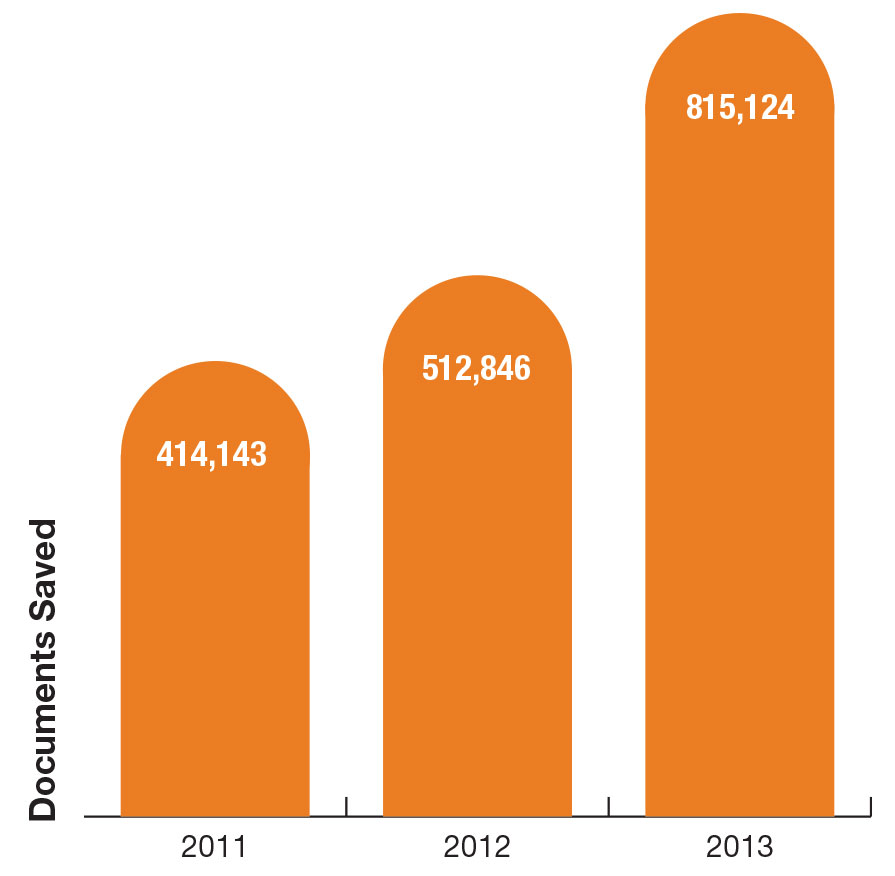
Principle 8: Communication
Internal Communications Plan
Enhancing Internal Communication and Engagement: A Plan for Main Roads was created to improve communication throughout the organisation. It is designed to engage employees via a consultative process rather than simply providing information.
Since the introduction of the plan, we have targeted communications training as identified in our employees’ Individual Development Plans. We had 45 employees undertaking the Getting the Best out of Your Communication workshop which equips them with practical skills and strategies for using different communication forms to their best advantage. Another 40 employees undertook the ‘Communication and Interpersonal Skills’ program which allows participants to be self-aware of their thinking styles. This helps them to identify critical factors in their ability to communicate effectively.
We have also developed communication strategies for important corporate initiatives such as our ‘Main Roads 2020 Strategic Plan’. The relevant communication strategy, ‘2020 Communication Plan’, includes various actions to raise awareness and understanding of our strategic direction over the next eight years. These actions utilise our intranet site, branding, articles, participation from key stakeholders, and provision of two-way feedback opportunities to enhance internal communications.
We have recently conducted an internal branding review to redesign our internal branding. This was piloted with the Development Employee area and feedback received has been very positive. We will extend this branding review to other areas across the organisation.
Social Media Guidelines
We recently established a set of Social Media Guidelines to raise our employees’ awareness of their responsibilities when using social media whether in a professional or private capacity. The guidelines will assist employees in identifying opportunities where social media can improve communication for specific events and campaigns.
These guidelines apply to all our employees and contractors and complement the Public Sector Commission Social Media Guidelines. We recognise that social media is evolving as a dynamic and effective way to communicate with internal and external stakeholders and customers. These guidelines will be rolled out to all employees over the next year.
Complaints Handling Process
We are committed to an accessible, fair and equitable complaints handling process that aligns our procedures with the Australian Standard for Complaints Handling (AS ISO 10002 – 2006). Information regarding the Policy is also readily available on our external website. The Corporate standard for response to complaints is 10 working days. Information regarding our process is provided to all employees through our intranet and during the induction process.
A monthly assurance check of this process is conducted via a complaints handling survey.
This survey assesses our customers’ experience with their complaints process and how the complaint was handled. Last year, 54% of people interviewed indicated that they were satisfied with how their complaint was handled. For the list of top complaints received, please refer to the Enhancing Relationships section, page 69.
Annual Report
We adopt a full, open and transparent approach when reporting on our operational and financial performance in our annual report. The report is also our medium for informing the public on our performance, expenditure of public funds and of any significant issues that occur. As only limited copies of the hard copy report are produced, an online version is available on our website.
In recognition of our high standard in annual reporting, we received a Gold award for our 2012 report in both the Lonnie Awards (WA) and the Australasian Reporting Awards. We also won ‘Best Online Report – Public Sector’ for the 2012 report which recognised that our report is accessible in an engaging way.
Managing Our Records
The State Records Act 2000 requires that we have a Recordkeeping Plan (RKP) which sets out matters about which records are created and how they are being kept. The RKP was approved in September 2010 and provides an accurate reflection of the recordkeeping program established. The Plan covers our recordkeeping system, disposal arrangements, policies, practices and processes reflecting our current functions. The following is a summary of compliance requirements and achievements during the year:
Improving Our Policies and Procedures:
- We have adopted Australian Standards AS ISO 15489 – Records Management best practice recordkeeping and implemented the principles and standards established by the State Records Commission.
- We constantly promote as benchmarks, the Code of Practice for the Management of Contract Records and the Code of Practice for Integrated Service Arrangement Records to participants involved in the Integrated Service Arrangements.
- We developed a Conversion Toolkit, a suite of complementary policies, and processing and procedure documentation, for when the function of invoice processing is returned to us from the Department of Finance, Shared Services.
- We have eased data entry loads through automating metadata capture for incoming scanned and emailed documents requiring registration into the recordkeeping system.
- We have also reviewed the existing scan process and added daily hardware integrity checks and quality assurance of converted digital output.
- We continue to face the impact of technology on the conduct of recordkeeping. A TRIM Data Migration Toolkit has been developed to assist in migrating data stored on shared network drives to the recordkeeping system. This follows the conduct of this exercise in two regions using a customised fit-for-purpose data migration tool coupled with software operator and recordkeeping system training.
- A record risk assessment checklist has been developed to assist in managing the use of public web-based cloud services for project collaboration. This will assist in determining a short term and long term strategy to ensure compliance with Main Roads Records Policy. It will also help us meet business needs to support project collaboration and document transfer to and from remote locations when delivering road infrastructure projects.
Retention and Disposition:
- The Retention, Disposal and Archiving program continues to be undertaken in compliance with the Main Roads Retention and Disposal Schedule and General Disposal Authorities. Employees are provided with the necessary tools and resources to identify and manage all record types in each phase of the schedule.
- A compliant process has been developed and implemented as specified in the State Records Commission Standard 8 (Principle 6) so that we can be in a position to destroy source hardcopy records in accordance with the General Disposal Authority for Source Records.
- We continue to use offsite storage facilities made available under the Common Use Agreement (CUA 34504) Storage, Retrieval and Destruction for Paper and Electronic Records.
- The Vital Records Policy identifies the main principles that ensure business continuity through the preservation and protection of core business records. Our Vital Records Register identifies the required level of compliance and remedial measures introduced to protect records listed. The Register continues to be updated.
Our Recordkeeping System:
- We have in place a Business Classification Scheme (BCS) based on the Keyword AAA method of file titling used throughout all tiers of Government. The BCS is directly accessible from the recordkeeping system and complementary thesaurus software supports ongoing user education, system maintenance and reporting.
- The TRIM recordkeeping system is maintained through the conduct of regular ongoing health monitoring, monthly data integrity checks, and regular license review and availability for all linked servers across the State.
- This year more than 815,000 documents have been registered into our recordkeeping system, a 60% increase over the previous year.
Ongoing Recordkeeping Training:
- Mandatory online Records Awareness and Customer Service training occurs for new employees and has been reviewed and updated.
- An online Indexing course continues to be available to records staff centrally and in the Regions.
- Instructor-led system training is offered across the State on a one-on-one, hands-on, tailored, or lecture format basis to all employees. This year a total of 287 end users have attended training sessions, consisting of 224 employees in the metropolitan area and 63 employees in the regional areas.
- The roles and responsibilities of employees under the Main Roads RKP continue to be delivered through induction training for new employees and during Instructor-led training for current employees.
- Our Regional Records officers have taken the opportunity to participate in ‘buddy’ training with Central Records staff to expand their knowledge of recordkeeping policies, processes, practices and procedures.
- We offered two University Practicum placements in Central Records to students who were able to gain experience and apply information theory and principals in a practical work environment.
- We regularly updated our policies, procedures, quick reference guidelines, fact sheets, frequently asked questions, news items, service provision, availability and contact points which were made available to employees through our intranet site.
- Documents placed on our external website and the intranet are required to be registered and updated in our recordkeeping system prior to publication. Training is provided for this process.
Reinforcing Recordkeeping Practices:
- We have developed and deployed a Corporate Work Program specifying work required to improve recordkeeping across the organisation and a Service Improvement Program specifying work required to improve service delivery to business areas from Central Records.
- We have an internal Help Desk Facility to assist all employees with TRIM technical problems. We also provide remote assistance when required and receive an average of 20 enquiries a day.
- We continue to work with Information Technology Managers to discuss and resolve technical and records-related issues bi-monthly.
- We share recordkeeping knowledge with our Portfolio partners.
- We assist our Regional and Metropolitan Offices through quarterly teleconferences to provide guidance, advice and assistance regarding common recordkeeping issues and concerns.
- The Internal Auditor continues to monitor and provide feedback on our record-keeping practices. Progress is being made on improvement opportunities in the areas of training, security of sensitive records, retention and disposal, and correspondence management.
- The Annual Records Seminar was well received as participants were given the opportunity to network, explore common issues and business processed, and meet and learn from others in an open constructive environment.
- We are currently undergoing an establishment restructure to assist in delivering records management, retention and disposal, records storage, records training and technical system support to all employees.
Freedom of Information
Certain information can be obtained under the Freedom of Information Act 1992. An information statement, which has been produced in accordance with the requirements of the Act, is available on our website. The statement provides a guide on how to obtain information from us under the Act and information that is available without a formal application. During the year, we received 32 applications with the majority of applications related to potential third-party liability claims and land acquisitions matters associated with road projects. The table below provides further statistics on applications received:
Freedom of Information Applications |
|||
Year |
2011 |
2012 |
2013 |
Received |
38 |
46 |
32 |
Internally Reviewed |
4 |
4 |
4 |
Externally Reviewed |
2 |
0 |
0 |
Our Freedom of Information Coordinator can be contacted on 138 138.
Public Interest Disclosures
We are committed to the aims and objectives of the Public Interest Disclosure Act 2003. We recognise the value and importance of the contributions of staff to enhance administrative and management practices and strongly support disclosures being made by staff regarding improper conduct.
The Public Interest Disclosure Act 2003 is made available on our intranet to all employees for their information. One matter was received in the last year but upon assessment was deemed not to be a disclosure.



